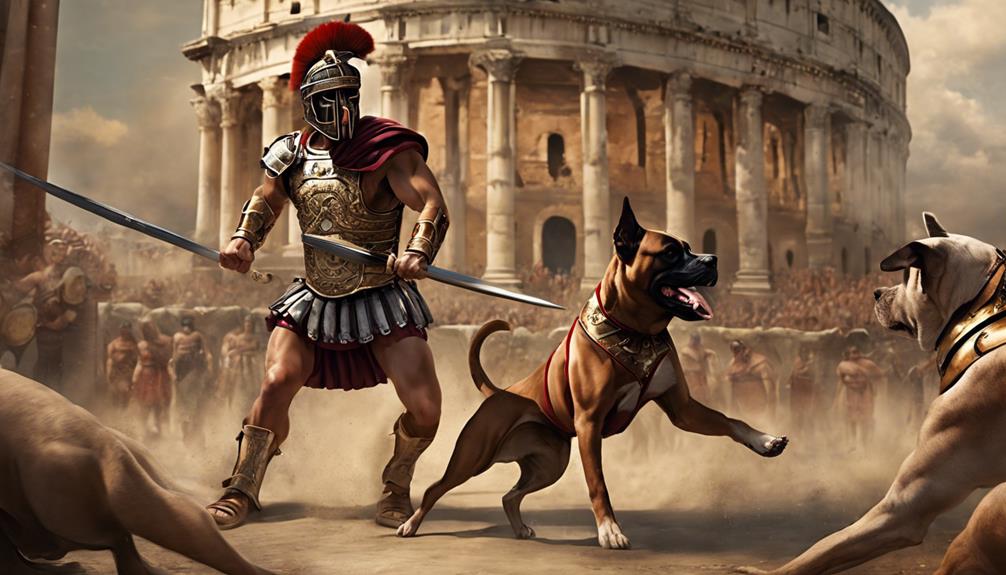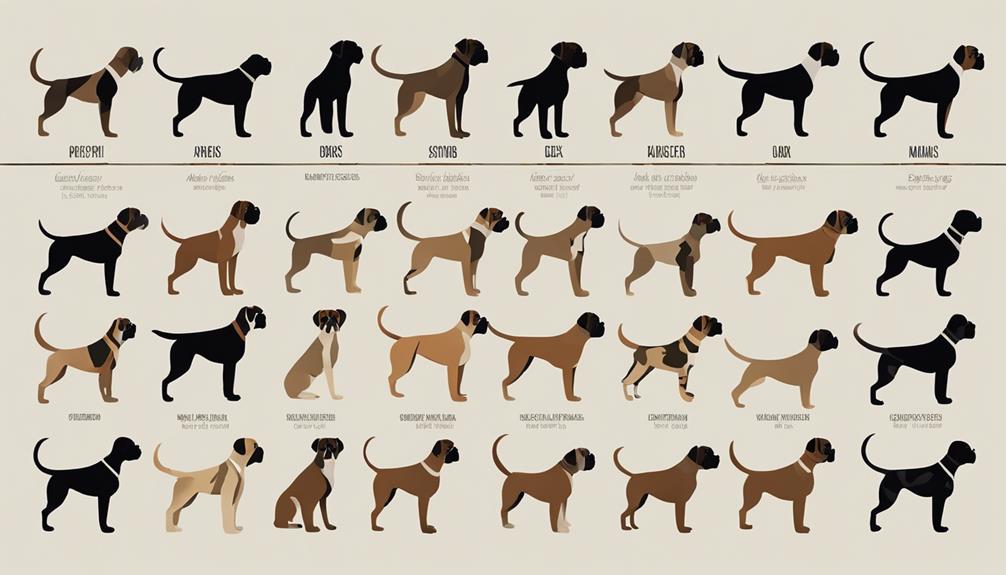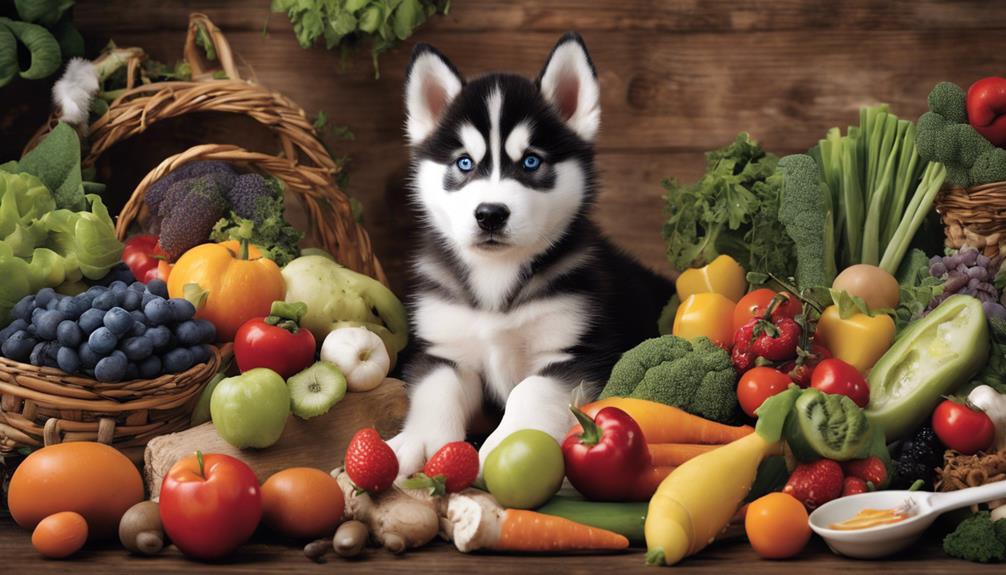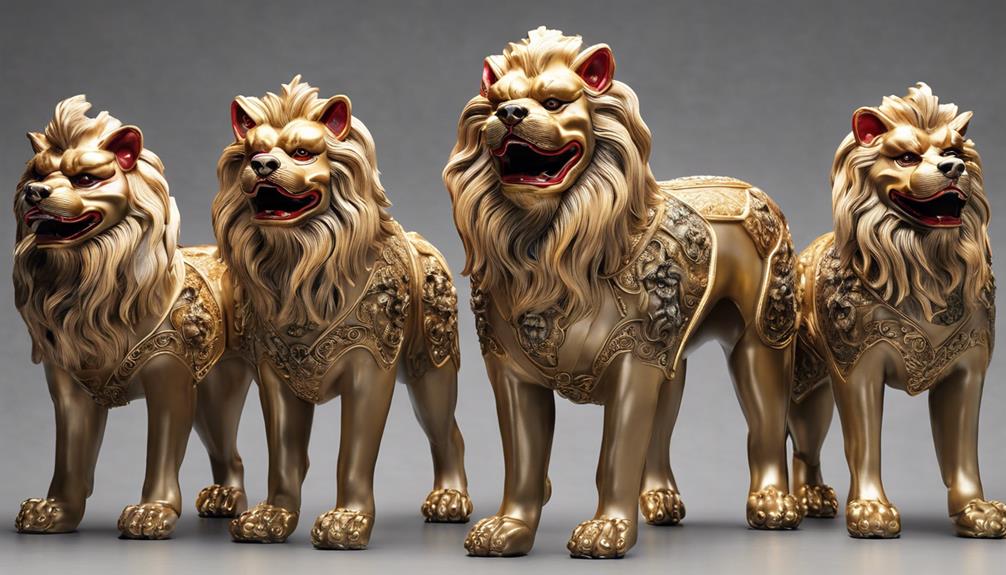The origin of Boxer dog names traces back to the breed's playful boxing stance, possibly influenced by German terms like 'boxl' and 'Bierboxer', with references dating to a Charles Dickens novel from 1845. These names reflect the evolution shaped by the breed's energetic nature, highlighting a blend of cultural references and historical roots in Boxer naming traditions. Understanding these origins can provide valuable insights into the unique characteristics of Boxers and the intricate connections that have shaped their names over time. Ready to uncover more about the fascinating history behind Boxer dog names?
Key Takeaways
- Boxer name linked to playful boxing stance and energetic nature.
- Possible origins from German word 'boxl' and 'Bierboxer'.
- Name 'Boxer' found in Charles Dickens novel from 1845.
- Evolution influenced by breed's lively and exuberant personality.
- Cultural significance celebrates breed's unique characteristics.
Origins of Boxer Dog Names
The origins of Boxer dog names trace back to various theories that connect the name 'Boxer' to the breed's playful boxing stance with their front paws. This playful and energetic nature of the Boxer breed has influenced the evolution of their name over time. Some believe that the name 'Boxer' stemmed from the German word 'boxl,' which was used in slaughterhouses, while others suggest a connection to the term 'Bierboxer' in Munich. Surprisingly, the name 'Boxer' can even be found in a Charles Dickens novel dating back to 1845, further adding to the mystery surrounding its origin.
The playful demeanor of Boxers has indeed played a significant role in shaping the way we perceive and name this beloved breed. Their lively and exuberant personality shines through in their name, reflecting the joy they bring to our lives. As we explore further into the history of Boxer dog names, we uncover a captivating journey that intertwines with the breed's playful essence.
Historical Influences on Boxer Names

In exploring the historical influences on Boxer names, one uncovers a tapestry woven with intriguing connections to the breed's past. The diverse history of Boxers reveals a multitude of factors that have shaped their nomenclature:
- The playful stance of Boxers, often resembling boxing moves with their front paws, is believed to have influenced the breed name, adding a touch of whimsy to their title.
- The possible origin of the name from 'Bierboxer' in Munich or the German word 'boxl' showcases the linguistic evolution that has contributed to the Boxer name we recognize today.
- References to Boxers in a Charles Dickens novel from 1845 and their potential use in slaughterhouses suggest a deeper historical significance behind the name, hinting at the breed's varied roles throughout the years.
These historical influences intertwine to form the intricate web of connections that give Boxer names their rich and storied background.
Cultural Significance of Boxer Names
Investigating the beginnings of Boxer names reveals a fascinating tapestry woven with cultural significance that mirrors the breed's history and unique characteristics. Boxer names often reflect the playful nature, intelligence, and loyalty that are inherent to this breed. Some names may even have connections to German origins or historical events, adding layers of meaning to the naming process. Naming a Boxer is a meaningful endeavor that honors the breed's heritage and celebrates its distinctive qualities and temperament.
| Cultural Significance of Boxer Names |
|---|
| Reflect playful nature |
| Highlight intelligence |
| Honor loyalty |
| Connect to German origins |
| Commemorate historical events |
Evolution of Boxer Naming Traditions

How did Boxer naming traditions evolve over time?
The name 'Boxer' is supposedly derived from the playful nature of the breed, as they often play by standing on their hind legs and mimicking a boxing motion with their front paws. This playful behavior has been a distinctive trait of the Boxer breed since the early days.
Additionally, some theories suggest that the name 'Boxer' may have evolved from 'Bierboxer' in Munich, Germany, indicating a historical link to a specific region. Furthermore, the association of the Boxer breed's name with the German word 'boxl,' used in slaughterhouses, adds another layer to the evolution of the name.
These factors, alongside the breed's popularity and the group dynamics of Boxers as a playful and energetic group of dogs, have influenced the naming traditions surrounding the Boxer breed.
Unveiling Unique Boxer Name Origins
Expanding on the origins of Boxer names reveals intriguing connections to the breed's playful nature and historical influences. The name 'Boxer' stems from the breed's playful boxing stance, embodying their lively and spirited character. Some theories trace the name back to Munich, Germany, possibly evolving from 'Bierboxer,' adding a touch of Bavarian flair to their title.
Additionally, references in a Charles Dickens novel from 1845 tie the name to a significant literary work, highlighting the breed's historical significance. Breed historians also draw connections to the German word 'boxl,' once used in slaughterhouses, shedding light on the Boxer's past roles and contributions.
The diverse influences behind the Boxer's name underscore its unique origins, reflecting a blend of playful demeanor, cultural references, and historical roots that have shaped this beloved breed throughout its rich history.
Frequently Asked Questions
How Did Boxer Dogs Get Their Names?
We'll explain how Boxer dogs got their names. Theories suggest it stemmed from their playful stance, Munich's 'Bierboxer,' and even words like 'boxl.' The name's origins remain a fascinating topic among breed enthusiasts.
What Is the Origin of a Boxer?
We'll explore the Boxer's origin, tracing back to Germany in the late 19th century. Bred from Bullenbeisser and Bulldogs, Boxers gained global adoration post-World War II. Their name potentially reflects their boxing-like stance and fighting spirit.
What Does Boxer Mean in Dogs?
Boxer in dogs means a breed known for its lively spirit and playful nature, often seen mimicking boxing with their paws. The name 'Boxer' likely originates from this characteristic stance, reflecting their energetic and affectionate temperament.
What Is the Life Expectancy of a Male Boxer Dog?
We've learned that the life expectancy of a male Boxer dog typically ranges from 9 to 10 years. Regular vet care and a healthy lifestyle can help extend their lifespan. Genetics and health factors also influence longevity.
Conclusion
To sum up, the beginnings of Boxer dog names have profound historical and cultural influences, molding the distinctive naming customs we witness today.
By examining the development of these names, we can reveal the intricate tapestry of meanings and importance behind each selection.
Understanding the origins of Boxer names not only adds depth to our admiration of these cherished dogs, but also illuminates the captivating connections between language, history, and canine companionship.









